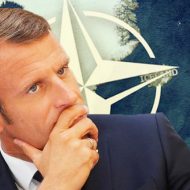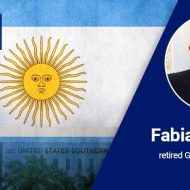The Schiller Institute has organized on July 8 and 9 an international conference titled “On the Verge of a New World War – European Nations Must Cooperate” in Strasbourg, France.
Several politicians and scholars from a wide range of countries participated, and UWI will present a number of selected speeches from the conference.
Today we present the speech held by Alain Corvez. Col. (ret.) Corvez is a consultant in international affairs, former advisor to the Ministry of the Interior, France.
Faced with the Risk of a New World War, European Countries Must Cooperate with the Global South
After all the speeches we just heard. I’m going to try to be very short. And after Helga’s intro- duction this morning, I felt that I didn’t have anything else to say. But after Mr. Ambassador, the other ambassador, and our Russian relative, all our speakers said very important things.
By inviting the other G7 countries (Canada, France, Germany, Italy, the United Kingdom and the United States) to the martyred city of Hiroshima from May 19 to 21, 2023, Japan wished to draw the world’s attention to the nuclear threat, exacerbated by the war in Ukraine. This historic initiative followed the ambitious nuclear disarmament plan launched by Japan at the Non-Proliferation Treaty (NPT) Review Conference in August 2022. The declaration finally adopted by the G7 on non-proliferation and nuclear disarmament contains no new initiatives, and merely reaffirms hackneyed dogmas.
It does, however, reiterate the statement made by the five NPT states in January 2022 that “a nuclear war cannot be won and must never be fought”.
All in all, the summit produced an interminable communiqué that exposes the usual hypocrisy of US-led Western powers, who make declarations of peace but unleash wars to destroy countries that do not submit to their visions.
NATO’s war against Russia in Ukraine
Today, on the unfortunate territory of the Ukraine, this West wants to destroy or dismantle Russia and prevent the geopolitical logic of close cooperation between Western Europe and its large European and Asian neighbor—the Americans see this as a threat to their domination of the continent—from unfolding in a dramatic conflict between Europeans. As Youssef Hindi explains in his latest book, the tragic blindness of Europeans in refusing to see “America’s War on Europe” reaches the heights of hypocrisy and even absurdity.
Russia has repeatedly indicated that it cannot continue to live under the permanent threat of US strategic nuclear missiles now deployed just a few kilometers from its borders, and that it would have to take steps to remedy the situation. In 2020 and 2021, it multiplied its negotiating proposals to the West to remove this threat and, failing to obtain a response, finally, in December 2021, its patience having run out, it proposed to the United States and NATO a draft strategic treaty by which both sides undertook not to threaten the other with strategic nuclear weapons installed in a neighboring country. (Allusion to the 1962 Cuban missile crisis between Kennedy and Khrushchev).
Once again, Russia had no answer, and announced in January 2022 that it would have to take techno-military measures to remove the threat that NATO did not want to discuss willingly.
This is what it is doing in Ukraine, where the United States and its blind allies face a powerful nuclear power that has prepared for this confrontation and is showing on the ground that the West cannot prevail even at the cost of the “last Ukrainians” decimated by the thousands on the battlefield. The Americans’ refusal to acknowledge this reality is truly iniquitous, as they are leading these murderous operations and have sabotaged all attempts at a negotiated settlement to the conflict, proposed by Turkey, Israel, China and Africa.
The escalation of weaponry supplied suggests that the United States, which is leading this macabre dance, will not stop before the American election of 2024, which brings us closer to the nuclear threshold where they may stop for fear of then seeing their country destroyed along with the rest of the planet.
For this tragic confrontation is taking place far from the American continent where they feel safe, and so far only a few mercenaries have been killed. They may think that crossing the threshold would only affect the European continent. But this is not the case. The lethal weapon, like its physical process, leads de facto to the spiral of power in an irreversible process.
There have been a number of initiatives to bring the conflict to an end by proposing the opening of negotiations, including Helga Zepp LaRouche’s proposal to support the Vatican as an impartial mediator. The Pope’s spiritual authority in the world could in fact propose that the nations of the world agree on an approach that would aim to bring a little humanity to this conflict that has become global. This initiative has gone unheeded, as has that of China, or more recently that of the Africans, presented by the President of South Africa. For the United States is pursuing its insane dream of perpetuating its domination of the world and maintaining the dollar as the universal currency.
However, the world is becoming increasingly organized to build a new geometry of power relations, as demonstrated by a recent international conference in Teheran on May 10 and 11, attended by representatives from over 40 countries.
The multipolar world that is taking shape respects national sovereignty and builds free cooperation between sovereign countries, outside any bloc ideology, which does not prevent the building of agreements based on mutual interests like the Chinese “Silk Road and Belt” initiative launched by President Xi Jing Ping in Kazakhstan in 2013, which is developing more and more; the BRICS (Brazil, Russia, India, China, South Africa) organization of developing nations that includes economic and financial aspects whose contribution to world GDP ( 31.7 percent) now exceeds that of the G7 (30.7 percent), and to which 25 countries have applied since the start of the war in Ukraine; the Shanghai Cooperation Organization (SCO), which also has strategic aspects; and the Eurasian Economic Union (EEU), to name but the most important, but within which nations retain full sovereignty, unlike the European Union, which has become an organization run from Brussels by unelected technocrats, out of touch with the will of the people.
The majority of the world, in terms of surface area, population, and energy resources, is organizing itself against the Western direction of the world.
In this tectonic movement to rebuild the world, Europe could play an eminent role, but it is excluding itself by its voluntary submission, in the sense given to it in the 16th Century by Etienne de La Boëtie in his “Discourse on Voluntary Servitude,” to the imperium of the United States. As the cradle of one of the world’s greatest civilizations, its Christian foundations have made it a beacon of spirituality, philosophical enlightenment, science and technology. Malraux explained that this civilization, “the greatest that mankind has known, was built on Christian transcendency” but dissolved in materialistic technology.
Can Europe revive?
To do so, nations must regain their sovereignty, which is the only legitimate expression of the will of their peoples, the foundation on which they have been built over the centuries, led by inspired and emblematic leaders who have guided them to success by building strong, independent states. These sovereign states could then organize themselves to cooperate with their immense eastern neighbor, so rich in resources, which would also offer them an opening towards Asia, and China in particular.
But geopolitical logic is not the prerogative of the European Union, artificially constructed by the United States to act as an anti-Soviet and anti-Russian glacis on the continent, whose avowed aim is to dissolve nations into a soulless technocratic whole. The American dollar and American materialism conquered Western Europeans devastated by the Second World War, who saw in the United States the champion of world freedom and economic prosperity, under whose tutelage it was sweet to place themselves. Then, after the collapse of Soviet communism, “Eastern Europeans” experienced the same fascination.
Now, false American culture, with its moral and social perversions that destroy the family, the basic cultural foundation of society, has invaded the entire continent. President Macron’s efforts to bring about this turnaround, as in Beijing recently, are commendable but doomed to failure. European nations must rediscover the essence of their sovereignty, which does not prevent them from agreeing on projects of mutual interest—on the contrary.
It is in the interest of European nations, and France in particular, to reach agreement and cooperate with the world’s great nations on the basis of mutual interests, starting with Russia, whose energy resources are indispensable to us, and China, which has become the workshop of the world, offering economic and commercial cooperation that needs to be rationally balanced. Europe must not join the United States in the war it is planning against China, a war that is not ours and which would be detrimental to our interests.
France, in particular, has important interests in the Indo-Pacific, and we must negotiate with China an equitable distribution of our influences, and even work on joint projects in the region. China is ready to do this, but the EU is not, which is why President XI Jing Ping invited President Macron and showed Ursula Van der Leyen, whose presence he was forced to accept alongside the French President, with traditional Chinese finesse and delicacy, that he was not interested in the EU.
Thanks to our numerous ultra-marine territories and the associated Exclusive Economic Zones (EEZs), we French hold the world’s largest maritime domain, with over 11 million square kilometers, just ahead of the United States, and we must have a navy capable of enforcing our sovereignty over this immense area. We therefore need to come to an agreement with China to establish the limits of our economic interests in the zones where it is legitimately concerned by our neighborhood, and there’s no point in sending our frigates to sail in the China Sea and the Taiwan Strait where we have nothing to claim, other than to provoke it needlessly to please the United States, who are themselves sailing behind our backs, as I said earlier about Antony Blinken’s statements in Beijing. In the summer of 2021, the brutal scuttling, without consultation, of our industrial and strategic agreements with Australia, in favor of a strategic AUKUS agreement between the UK, the USA, and Australia, should make us realize that a sovereign France cannot place the slightest trust in such so-called allies.
Let’s not count on the EU to go and defend our ultra-marine interests, which would be threatened in the antipodes.
Conclusion
The world’s barycenter has inexorably shifted eastwards, and the emerging powers of the East, Africa, and Latin America are organizing themselves to balance their international relations in a world where the United States, while it remains and will doubtless remain a major power, will no longer be able to impose its domination, but will have to respect the interests of all sides. It’s now clear that the majority of the world’s population—whether ostensibly or more discreetly— supports Russia in its fight against NATO, and that nations suffering from their hostility, such as China, Iran, Syria and Yemen in particular, are drawing the consequences of this weakening, as are those who have switched sides altogether, such as Saudi Arabia and several BRICS countries, with India and Turkey playing both sides to their advantage but trading amicably with Russia.
The world aspires to peace, even if disputes between nations have not disappeared but will have to be settled through diplomacy and mutual respect for the interests of the conflicting parties. The brutal warlike interventions of the United States, which have already devastated many countries and continue to threaten the world with their 800 military bases, must cease. The latest conflict they provoked in Ukraine against Russia, by lying to it since 1997 about the deployment of NATO and again in 2014 with the false Minsk agreements, with the avowed aim of destroying or at least weakening it, in any case cutting it off from Western Europe. This is because, unable to win on the military front, they want to provoke a nuclear conflict that they foolishly believe they can limit to the European continent. As I said earlier, the use of tactical nuclear weapons would automatically lead to a thermonuclear conflict that would destroy the planet. In an official speech on the airwaves in response to American declarations of the possible first use of tactical weapons, Putin, who knows the risk of this spiral, had said that he weighed up this threat and that Russia could also use tactical weapons, which it possesses in greater numbers than the West, but that it saw no need to do so first, pointing out that nuclear weapons are the ultimate weapon if a country’s very existence is threatened. Western journalists deliberately distorted his clear words.
The military failure on the ground in Ukraine brings us closer to the nuclear threshold that the United States seems intent on crossing, in the mistaken belief that it will emerge unscathed. This is a folly that many are denouncing, even at home, where candidates in the forthcoming presidential elections have understood this and are promising to put an end to this tragic conflict, including in the Democratic camp with Robert F. Kennedy.
The reasonable world must mobilize to avoid a nuclear war, which would obviously be global. All peace initiatives have so far been rejected by the United States. Yes, European countries must join forces with Latin America, Africa and Asia to put an end to this conflict by tackling its root causes. This is the future of the world.
In this context, it would seem that the moral and spiritual authority of the Supreme Pontiff, as proposed by Helga Zepp LaRouche, would be the best vector to encourage and support this movement for peace by the international community.









Leave a Reply